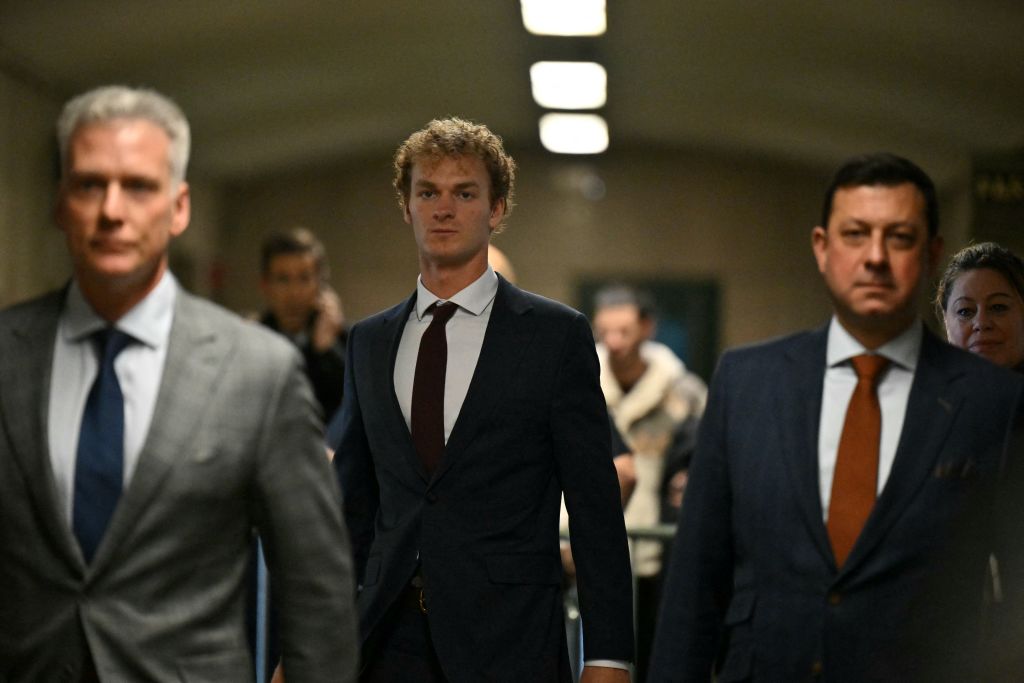Daniel Penny Jury ‘Unable To Come to A Unanimous Vote’ On Manslaughter Verdict In Jordan Neely Killing

Daniel Penny walks in the hallway at Manhattan Criminal Court as the jury deliberates in his manslaughter trial in connection with the chokehold death of Jordan Neely, in New York, December 6, 2024. | Source: ANGELA WEISS / Getty
Jurors in the manslaughter trial of Daniel Penny — the former Marine accused of causing the death of unarmed Black man Jordan Neely by choking him in a subway car in NYC on May 1, 2023 — are having a difficult time reaching a verdict in the case. In fact, on Friday morning, the jurors sent Judge Maxwell Wiley a note stating they were “unable to come to a unanimous vote on count 1.”
Allen responded by sending the jury what’s known as an Allen charge, which is an instruction urging them to make every possible effort to make a unanimous decision.
Just 20 minutes after the judge issued the Allen charge, the jurors, still unable to reach a verdict, sent back another note requesting more information about the term “reasonable person” in the instructions they received.
From ABC 7:
“Ultimately what a reasonable person is up to you to decide,” Judge Wiley told the jury in response to their note, referring them to a two-part test in jury instruction.
To convict Penny of manslaughter, the jury must be convinced Penny acted recklessly and grossly deviated from how a reasonable person would behave knowing the risk his conduct posed.
“Would a reasonable person have had the same honestly held belief as the defendant given the circumstances and what the defendant knew at that time?” Wiley asked, referring to the second part of the test.
The verdict form asks the jury to decide the first count – second degree manslaughter – before potentially moving to the second count of criminally negligent homicide. Only if they find Penny not guilty on the first count, can they consider the second count of criminally negligent homicide.
Manslaughter is, by far, the more serious charge in the case. It carries a maximum sentence of 15 years in prison while negligent homicide “carries punishments ranging from probation to up to four years in prison,” ABC reported.
Many believe that no “reasonable person” would believe it was practical to respond to verbal threats with a deadly chokehold, which is how Penny reacted to Neely, who hadn’t physically attacked anyone. Penny has justified putting Neely in the chokehold a medical examiner says killed him by repeating ad nauseam that passengers on the subway car were afraid as Neely, who was homeless and reportedly suffered from mental illness, shouted and ranted and allegedly issued verbal threats — but is it “reasonable” to believe people being scared of a man who hasn’t physically attacked anyone or even displayed a weapon justifies swift and deadly action?
Unfortunately, there are also many people who believe Penny’s actions were warranted, or that the case isn’t as cut and dry as those demanding justice for Neely believe it is. (Then, of course, there’s always the lingering question: Do Black lives really matter?)
Prosecutor Dafna Yoran remarked that “it would be a crazy result to have a hung jury” just because they can’t get to the second count.
What’s “crazy” is how easy it is to consider the Jordan Neelys of the world disposable.
SEE ALSO:
Infamous ‘Subway Vigilante’ Bernhard Goetz Speaks Out About Daniel Penny’s Chokehold Trial
The Killing Of Jordan Neely And Why Police Should Also Be Held To Account


